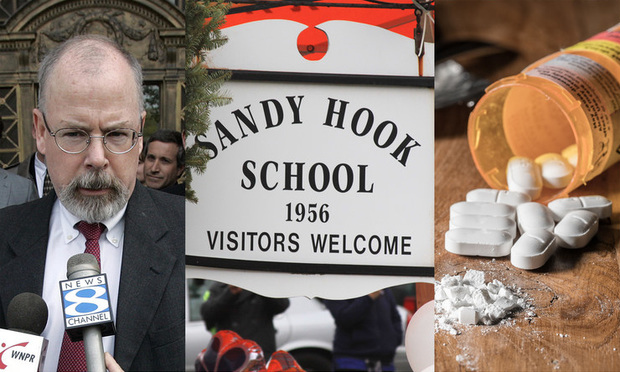2017 in Review: The Biggest Legal Developments in Connecticut
This year saw many legal twists and turns. The Connecticut Law Tribune looks back at the top five news stories ranging from a law firm allegedly destroying evidence to the state's high court hearing oral arguments in the Sandy Hook case.
December 29, 2017 at 12:13 PM
5 minute read

Destruction of evidence, liability over gun sales, and state limitations on vaccinations were among some of the biggest legal fights in Connecticut courtrooms in 2017.
The legal spats tied up Big Law, large companies and Connecticut families. Some of the cases will continue to unfold through 2018. Here's a look at some of the litigation from the past year.
Connecticut Municipalities Target Big Pharma Over Opioid Crisis
Three of the state's largest cities—New Haven, Waterbury and New Britain—targeted the nation's largest drugmakers, seeking to recoup costs incurred from the opioid crisis. The lawsuits were part of a wave of litigation filed in the wake of the opioid crisis in 2017.
New Haven and New Britain are represented by Scott + Scott, while the Waterbury is backed by Simmons Hanly Conroy. Both firms have filed similar municipal lawsuits nationally.
The lawsuits are similar in that all three claim there is a long-standing campaign to mislead the public about the dangers of prescription opioids. The lawsuits contend drugmakers have published misleading articles in medical journals encouraging the use of opioids to treat chronic pain. The suits also allege the manufacturers continue to sponsor medical courses that persuade doctors that opioids don't pose a serious threat of addiction.
Earlier this month, the U.S. Judicial Panel on Multidistrict Litigation ordered all federal lawsuits brought by cities, counties and states to be transferred to Ohio.
Sandy Hook Families, Gunmakers Spar at the Supreme Court
The state's high court heard oral arguments on whether families of Sandy Hook school shooting victims can hold gunmakers liable through negligent entrustment.
A trial court tossed out the lawsuit against gunmakers Bushmaster and Remington, makers of the AR-15 rifle used to kill 20 students and six educators in December 2012.
Thirteen amicus briefs were filed on behalf of 19 entities in what many legal experts believe could be a landmark Second Amendment decision. Among the amicus filings was a brief from the National Rifle Association on behalf of the gunmakers. Paul Clement, C. Harker Rhodes IV and Erin Murphy of Kirkland & Ellis stepped in for the NRA. They were also joined by Kenneth Slater Jr. of Halloran & Sage.
Venable Accused of Helping Destroy Evidence
In papers filed last month in federal court in Connecticut, Brunswick Rail Management claims Venable—along with Brunswick's former chief executive officer—destroyed evidence in a trade secrets case. The underlying lawsuit claims former CEO and New Canaan resident Paul Ostling relayed confidential information and trade secrets to creditors who could then use the information to hurt Brunswick's bargaining position in a $600 million debt restructuring.
Brunswick is a Moscow-based company that leases a fleet of 25,000 railcars to corporate clients in Russia.
In court papers, Brunswick claims Ostling and Venable ignored a February preliminary injunction barring destruction of evidence. A contempt of court motion claims Venable “disregarded the PI order and hired an e-discovery vendor to access the Brunswick-owned devices and, in doing so, altered and/or deleted critical forensic evidence of Mr. Ostling's spoliation in the process.”
Trump Taps John Durham as U.S. Attorney for Connecticut
In his eighth wave of nominations, President Donald Trump nominated longtime prosecutor John Durham to be the next U.S. attorney for the District of Connecticut in December.
Durham will replace Deirdre Daly if approved by the Senate. Daly, who stepped down in October, was among a handful of President Barack Obama appointees allowed to stay during Trump's transition.
A Republican, the 67-year-old Durham previously served as counsel to the U.S. attorney in Connecticut. He had been a Justice Department attorney since 1982. His previous Connecticut posts included working as acting U.S. attorney and deputy U.S. attorney, and he was chief of the Criminal Division.
He also previously headed the New Haven field office and the Boston Strike Force on Organized Crime. Durham had also been involved in special investigations under four different attorneys general.
Connecticut Supreme Court Curbs State Agency's Power to Vaccinate
In a rebuke of the state Department of Children and Families, the Connecticut Supreme Court ruled twice—in August and October—that the agency can't vaccinate a child in state custody without parental approval.
In its August 7-0 ruling, the high court agreed with the parents that preventative vaccinations are not “medical treatment” because “treatment” is defined as curing an injury or disease. The high court unanimously reaffirmed its initial ruling two months later when DCF asked for a review because it mistakenly relied on the wrong statute.
DCF had originally filed a petition alleging the parents of the two children, both under 10 years old at the time, were neglectful but sought custody. The parents agreed the children should be committed to DCF's care but objected on religious grounds to the vaccinations.
This content has been archived. It is available through our partners, LexisNexis® and Bloomberg Law.
To view this content, please continue to their sites.
Not a Lexis Subscriber?
Subscribe Now
Not a Bloomberg Law Subscriber?
Subscribe Now
NOT FOR REPRINT
© 2025 ALM Global, LLC, All Rights Reserved. Request academic re-use from www.copyright.com. All other uses, submit a request to [email protected]. For more information visit Asset & Logo Licensing.
You Might Like
View All
Connecticut's Wiggin and Dana Absorbs Boca Raton Trusts and Estates Boutique
3 minute read
Law Firm Leaders Say Gen AI Can Level Playing Field Between Large and Smaller Firms
6 minute read
Revenue Up 11.2%, PEP Up 22.1% at Akin, as Aggressive Hiring Pays Off
5 minute read
New England's Hinckley Allen Expands Southward, Opening 7th Office in Fort Lauderdale
2 minute readTrending Stories
- 1Uber Files RICO Suit Against Plaintiff-Side Firms Alleging Fraudulent Injury Claims
- 2The Law Firm Disrupted: Scrutinizing the Elephant More Than the Mouse
- 3Inherent Diminished Value Damages Unavailable to 3rd-Party Claimants, Court Says
- 4Pa. Defense Firm Sued by Client Over Ex-Eagles Player's $43.5M Med Mal Win
- 5Losses Mount at Morris Manning, but Departing Ex-Chair Stays Bullish About His Old Firm's Future
Who Got The Work
J. Brugh Lower of Gibbons has entered an appearance for industrial equipment supplier Devco Corporation in a pending trademark infringement lawsuit. The suit, accusing the defendant of selling knock-off Graco products, was filed Dec. 18 in New Jersey District Court by Rivkin Radler on behalf of Graco Inc. and Graco Minnesota. The case, assigned to U.S. District Judge Zahid N. Quraishi, is 3:24-cv-11294, Graco Inc. et al v. Devco Corporation.
Who Got The Work
Rebecca Maller-Stein and Kent A. Yalowitz of Arnold & Porter Kaye Scholer have entered their appearances for Hanaco Venture Capital and its executives, Lior Prosor and David Frankel, in a pending securities lawsuit. The action, filed on Dec. 24 in New York Southern District Court by Zell, Aron & Co. on behalf of Goldeneye Advisors, accuses the defendants of negligently and fraudulently managing the plaintiff's $1 million investment. The case, assigned to U.S. District Judge Vernon S. Broderick, is 1:24-cv-09918, Goldeneye Advisors, LLC v. Hanaco Venture Capital, Ltd. et al.
Who Got The Work
Attorneys from A&O Shearman has stepped in as defense counsel for Toronto-Dominion Bank and other defendants in a pending securities class action. The suit, filed Dec. 11 in New York Southern District Court by Bleichmar Fonti & Auld, accuses the defendants of concealing the bank's 'pervasive' deficiencies in regards to its compliance with the Bank Secrecy Act and the quality of its anti-money laundering controls. The case, assigned to U.S. District Judge Arun Subramanian, is 1:24-cv-09445, Gonzalez v. The Toronto-Dominion Bank et al.
Who Got The Work
Crown Castle International, a Pennsylvania company providing shared communications infrastructure, has turned to Luke D. Wolf of Gordon Rees Scully Mansukhani to fend off a pending breach-of-contract lawsuit. The court action, filed Nov. 25 in Michigan Eastern District Court by Hooper Hathaway PC on behalf of The Town Residences LLC, accuses Crown Castle of failing to transfer approximately $30,000 in utility payments from T-Mobile in breach of a roof-top lease and assignment agreement. The case, assigned to U.S. District Judge Susan K. Declercq, is 2:24-cv-13131, The Town Residences LLC v. T-Mobile US, Inc. et al.
Who Got The Work
Wilfred P. Coronato and Daniel M. Schwartz of McCarter & English have stepped in as defense counsel to Electrolux Home Products Inc. in a pending product liability lawsuit. The court action, filed Nov. 26 in New York Eastern District Court by Poulos Lopiccolo PC and Nagel Rice LLP on behalf of David Stern, alleges that the defendant's refrigerators’ drawers and shelving repeatedly break and fall apart within months after purchase. The case, assigned to U.S. District Judge Joan M. Azrack, is 2:24-cv-08204, Stern v. Electrolux Home Products, Inc.
Featured Firms
Law Offices of Gary Martin Hays & Associates, P.C.
(470) 294-1674
Law Offices of Mark E. Salomone
(857) 444-6468
Smith & Hassler
(713) 739-1250










